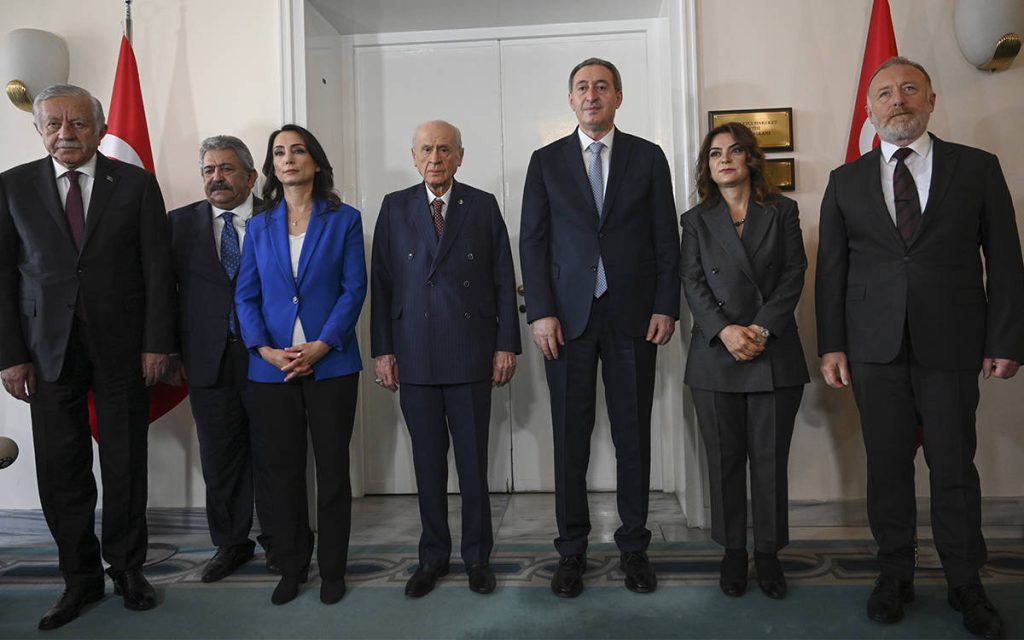In a recent meeting that lasted approximately 40 minutes, the co-chairs of the Democratic Party (DEM), Tuncer Bakırhan and Tülay Hatimoğulları, met with the leader of the Nationalist Movement Party (MHP), Devlet Bahçeli, in his office within the Turkish Parliament. The closed-door meeting also saw attendance from notable figures including Deputy Speaker Celal Adan and MHP Deputy Chair Feti Yıldız, along with several delegation members from the DEM Party. Afterwards, a representative from the DEM Party highlighted the positive outcomes of the discussion, particularly focusing on legislative changes that may allow for the early release of prisoners.
| Article Subheadings |
|---|
| 1) Meeting Details and Participants |
| 2) Positive Outcomes and Legislative Topics Discussed |
| 3) Future Steps and Legislative Commission |
| 4) Importance of Political Collaboration |
| 5) Next Engagement with AKP |
Meeting Details and Participants
The meeting took place in the bustling environment of the Turkish Parliament, where the DEM Party’s co-chairs, Tuncer Bakırhan and Tülay Hatimoğulları, engaged in discussions with Devlet Bahçeli. Presence was notable, with key figures such as Deputy Speaker Celal Adan and MHP Deputy Chair Feti Yıldız joining the conversations. This meeting reflects ongoing political dialogues within Turkey, characterized by intricate coalition dynamics as parties navigate their objectives and challenges. The meeting was described as closed to the press, signaling the sensitive nature of the discussions at hand, and underscoring the importance of privacy in their negotiations.
Positive Outcomes and Legislative Topics Discussed
Following the meeting, Gülüstan Kılıç Koçyiğit, a Group Deputy Chair of the DEM Party, reported positively on the outcomes of their discussions. A key agenda item was the proposed “execution law,” aimed at providing opportunities for the early release of various prisoners. This law has stirred significant public interest and political debate, as it has implications for the judicial landscape and could be seen as a gesture towards broader reforms. The atmosphere during the meeting was reported as constructive, with officials actively engaged in a dialogue about the evolving laws and policies affecting the nation’s citizens.
Future Steps and Legislative Commission
In their post-meeting statements, the DEM Party officially emphasized the necessity of action moving forward. They articulated the need for a fully authorized commission within the Grand National Assembly of Turkey, which Bahçeli had called for, highlighting the importance of collaborative efforts among political parties. Discussions included exploration of new judicial packages and potential reforms aimed at democratizing the political framework in Turkey. Many party representatives stressed that active participation among political factions is crucial to ensure a well-rounded legislative approach, ultimately benefiting the democratic process.
Importance of Political Collaboration
This meeting signifies a pivotal moment in Turkish politics, showcasing the critical need for political collaborations across party lines. Discussions revolving around the democratization process and the future of the legislative framework underline an essential commitment to address both imminent challenges and long-standing issues. The DEM Party’s dialogue with the MHP encapsulates their stance to engage with overarching topics that affect Turkish society, indicating a broader intention to create consensus-driven policies. Experts suggest that such meetings could lead to tangible reforms and signal the potential for bipartisan harmony amidst a fluctuating political climate.
Next Engagement with AKP
Following their meeting with Bahçeli, the DEM Party announced plans to hold an engagement with the ruling Justice and Development Party (AKP) the following day. This upcoming discussion could have significant ramifications for future collaborations and strategies among Turkey’s political parties. Given the context of ongoing reforms and the legislative landscape, the DEM Party aims to establish a foothold that advocates for not only its agenda but also the interests of the Turkish populace at large. Observers will be keen to see how this meeting unfolds and the potential it holds for further legislative actions in Parliament.
| No. | Key Points |
|---|---|
| 1 | The DEM Party delegation met with MHP leader Devlet Bahçeli to discuss ongoing legislative efforts. |
| 2 | A significant topic of discussion was the proposed “execution law” for the early release of certain prisoners. |
| 3 | The importance of establishing a legislative commission to facilitate bipartisan collaboration was emphasized. |
| 4 | Political collaboration is deemed crucial for effective governance and reform in Turkey. |
| 5 | The DEM Party plans to meet with the AKP delegation to continue discussions on legislative reforms. |
Summary
The recent meeting between the DEM Party and MHP leadership illustrates the ongoing dialogues and collaborative efforts taking place within Turkey’s political sphere. As both parties explore crucial legislative areas such as the proposed “execution law” and the formation of a new parliamentary commission, their interactions underscore the significance of political partnerships in addressing societal challenges. The forthcoming discussions with the AKP may further shape the future of Turkey’s legislative framework, fostering an environment of cooperation essential for effective governance.
Frequently Asked Questions
Question: What is the “execution law” discussed in the meeting?
The “execution law” is a proposed legislative act aimed at allowing for the early release of prisoners, potentially impacting many inmates across Turkey.
Question: Why is political collaboration emphasized in Turkish politics?
Political collaboration is viewed as critical for effective governance, enabling parties to work together to create reforms that reflect the needs of the populace.
Question: What are the expectations for the upcoming meeting with the AKP?
The upcoming meeting with the AKP is expected to further discussions on legislative reforms and solidify political alliances aimed at improving Turkey’s governance structure.
